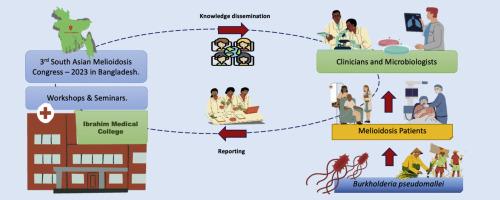Melioidosis cases detected in Dhaka, Bangladesh: a positive impact of 3rd South Asian melioidosis congress-2023
IF 5.8
Q1 MICROBIOLOGY
引用次数: 0
Abstract
Melioidosis is a fatal infectious disease caused by the gram-negative soil dwelling bacterium Burkholderia pseudomallei. Bangladesh is considered a definite country for melioidosis owing to the isolation of the organism both from clinical samples as well as soil. Only around 100 cases of melioidosis have been diagnosed sporadically in the country for the past 60 years till October 2023 and about 90 % of these cases were detected in BIRDEM General Hospital. A dilemma existed for researchers worldwide whether the disease is actually rare in this part of the continent or whether it is the limitation of our clinicians and microbiologists keeping the disease neglected due to a lack of clinical and laboratory suspicion, knowledge gap and occasionally lack of adequate laboratory facilities. Consequently, to overcome these obstacles, a group of dedicated researchers began conducting workshops, seminars and finally arranged the 3rd South Asian Melioidosis Congress-2023 to disseminate knowledge on the fatality of the disease and ways to detect and manage the cases among the physicians all over the country. The outstanding outcome of these melioidosis centered educational sessions was the isolation and identification of nine melioidosis cases from different clinical settings of the country, other than BIRDEM. We present the nine melioidosis cases with different clinical manifestations. Interestingly, 33.3 % patients were non-diabetic, although two of the nine patients had other chronic illness, while a young patient of 28 years had no known co-morbidities at all. Eight of the nine patients recovered after six months treatment, while one patient unfortunately expired. The case series is expected to raise vigilance among the concerned physicians and microbiologists of the country to keep the suspicion of melioidosis at the back of their mind in high risk patients, thus improving the chance of early diagnoses and management.

在孟加拉国达卡发现的类鼻疽病例:第三届南亚类鼻疽大会-2023的积极影响
类meliosis是一种由革兰氏阴性土壤细菌假马利氏伯克氏菌引起的致命传染病。孟加拉国被认为是类鼻疽病的明确国家,因为从临床样本和土壤中都分离出了这种有机体。在截至2023年10月的过去60年里,该国只有大约100例类鼻疽病被零星诊断出来,其中约90%的病例是在BIRDEM总医院发现的。对于全世界的研究人员来说,一个两难的问题是,这种疾病在非洲大陆的这一地区实际上是罕见的,还是由于缺乏临床和实验室的怀疑、知识差距和偶尔缺乏足够的实验室设施,我们的临床医生和微生物学家的局限性使这种疾病被忽视。因此,为了克服这些障碍,一组专门的研究人员开始举办讲习班和研讨会,并最终安排了第三届南亚类meliosis大会-2023,在全国各地的医生中传播关于该疾病的致死率以及发现和管理病例的方法的知识。这些以类鼻疽病为中心的教育会议的突出成果是从该国不同的临床环境中分离和鉴定出9例类鼻疽病病例,而不是BIRDEM。我们报告了9例具有不同临床表现的类鼻疽病例。有趣的是,33.3%的患者没有糖尿病,尽管9名患者中有2名患有其他慢性疾病,而一名28岁的年轻患者根本没有已知的合并症。经过6个月的治疗,9名患者中有8人康复,而1名患者不幸死亡。该病例系列预计将提高该国有关医生和微生物学家的警惕,使他们在高风险患者中保持对类鼻疽病的怀疑,从而提高早期诊断和管理的机会。
本文章由计算机程序翻译,如有差异,请以英文原文为准。
求助全文
约1分钟内获得全文
求助全文
来源期刊

Current Research in Microbial Sciences
Immunology and Microbiology-Immunology and Microbiology (miscellaneous)
CiteScore
7.90
自引率
0.00%
发文量
81
审稿时长
66 days
 求助内容:
求助内容: 应助结果提醒方式:
应助结果提醒方式:


